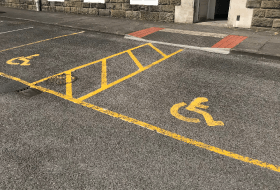Exemptions for Council Tax
Page updated on: 05/09/2023
Normally properties occupied by 2 or more adults will be subject to full Council Tax and vacant properties will be subject to a 100% charge (after an initial six months free period).
However, reductions are available for single occupants and properties occupied by people with special circumstances and full exemption can apply to properties that fulfil certain conditions.
These are brief notes for guidance only and further conditions may apply.
| Criteria for exemption | Comments |
|---|---|
| Property becoming unoccupied and substantially unfurnished. | The exemption is limited to a period of 6 months regardless of a change of owner or council tax payer. |
| Unoccupied and unfurnished dwellings where major works are required, under way or recently completed. | The exemption is limited to a period of 12 months regardless of a change of owner or council tax payer. |
| Properties left empty by patients in hospital or care homes. | This does not apply to short stays. |
| Dwellings left unoccupied by persons receiving care (other than in a hospital/care home). | Dwelling must have been the main residence of the person receiving care. Does not apply to short periods of convalescence. |
| Dwellings left unoccupied by persons providing care. | Dwelling must have been the main residence of the person providing care. |
| Council Tax Payer has passed away and property has been unoccupied since then. | Exemption applies in respect of deceased owners (when there is no current owner) and to deceased tenants when the personal representatives are still liable to pay rent. Exemption will cease when 6 months have elapsed after obtaining a grant of probate or letters of administration (but a discount may apply after this). |
| Repossessed properties where mortgagee is in possession. | Property must be unoccupied. |
| Unoccupied annexes | Only where the annexe cannot be let separately from the main home due to planning restrictions. |
| Empty dwellings owned by charities. | For a maximum period of 6 months provided the property was being used for the purpose of the charity. |
| Empty Clergy dwellings. | Exempt only if held for the future occupation by a minister of religion |
| Dwellings left unoccupied by Prisoners. | The dwelling must have been, or would be, their main home (does not apply if offence is for non payment of Council Tax or fine). |
| Dwellings which are prohibited by law from being occupied. | Does not apply if the property is occupied illegally. |
| Empty properties where the owner is a student. | Must have been last occupied as the main residence of the student owner. The owner must have been a student since leaving, or become a student within 6 weeks of leaving. |
| Dwellings left empty by bankrupts. | Allowed only where the liable person is a trustee. |
| Dwellings consisting of a caravan pitch or mooring | Only when not occupied by a caravan or boat |
| Halls of residence for students | Accommodation must be owned or managed by a prescribed educational establishment or by a body established for charitable purposes only. |
| Dwellings occupied exclusively by relevant persons i.e. full time students, those under 20 years of age doing a qualifying part-time course, or foreign language assistants or by certain non-British spouses/ civil partners / dependants of the above, or by certain school / college leavers. | Part-time students must be under 20 years of age doing courses usually carried out during the day and which are not courses of higher education, The non-British spouses/ partners/dependants must be prevented from taking paid employment or claiming state benefits, and the school-leavers must have left after 30th April and before 1st November in any year. |
| Dwellings occupied exclusively by persons who are Severely Mentally Impaired or where relevant persons are also occupying. | Does not apply if the person who is severely mentally impaired would not, otherwise be liable e.g. a nursing home when the owner, and not the resident, is liable. A doctor’s certificate will be required and the person must be entitled to a qualifying state benefit. Exemption still applies if a relevant person is also occupying (see above category for relevant persons). |
| An Annexe occupied by an elderly or disabled relative. | Must be the main residence of a person aged 65 or more, or who is severely mentally impaired, or who is substantially and permanently disabled. Must also be related to a person who is resident in the main dwelling. |
| Dwellings occupied exclusively by those under 18. | Exemption will continue until an occupier becomes 18. |
| Armed Forces Accommodation. | Exemption applies to dwellings owned by the Secretary of State for Defence whether occupied or unoccupied. |
| A dwelling occupied by a person with diplomatic (or similar) privilege or immunity | Exemption does not apply if that person would not, otherwise, be liable. The person must not be a British citizen or a permanent resident in the UK. |
| Dwelling occupied by a member (or dependant of a member) of a Visiting Force. | Exemption does not apply if that person would not, otherwise, be liable. Also applies to a member of a civilian component of the Force, or a dependant of a member provided the dependant is not a British citizen or is not ordinarily resident in the UK. |
These are brief notes for guidance only and further conditions may apply.
| Person's circumstances | Comments |
|---|---|
| Under 18s | Under 18s are not regarded as residents for Council Tax purposes. See also exempt properties. |
| Full time students, those under 20 years of age doing a qualifying part-time course, and foreign language assistants | See also exempt properties |
| A non-British spouse, civil partner or dependant of a person falling within the category shown immediately above. | Must be prevented from taking paid employment or claiming state benefits – see also exempt properties relating to students etc. |
| 18 & 19 year olds, who have left school or college after 30th April. | Disregarded until 1st November. |
| People in respect of whom Child Benefit is payable. | This applies to those 18 or over (under 18s are not regarded as residents). |
| Youth Training Trainees. | Must be under 25 and undertaking an approved training course. |
| Apprentices. | Must be undertaking a training course leading to a recognised qualification and paid not more than £195.00 per week. |
| People living with & caring for someone. | Except where the person is caring for a spouse, partner or child under 18 (if the carer is the parent). Care must be provided for at least 35 hours a week (on average). The person being cared for must be entitled to a qualifying state benefit. |
| Care workers on low pay. | Caring for at least 24 hours a week and receiving not more than £44.00 per week. |
| People who are Severely Mentally Impaired. | A doctor’s certificate will be required and the person must be entitled to a qualifying state benefit. See also exempt properties. |
| Convicted and Remand Prisoners. | Except where offence is for non payment of Council Tax or a fine. |
| Person whose main residence is in a hospital. | The person will be disregarded in respect of the dwelling provided at the hospital. |
| Person whose main residence is in a nursing/care home. | Must be receiving care or treatment to be disregarded at the nursing/care home. |
| Members of a religious community. | Provided there is no personal income or capital (receipt of a former employment pension does not disqualify). |
| Residents of hostels for the homeless or night shelters. | The premises must be used essentially for persons of no fixed abode and the accommodation must not be self-contained. |
| Members and dependants of a Visiting Force. | May also be a member of a civilian component of the force, or a dependant of a member, provided the dependant is not a British citizen or is not ordinarily resident in the UK. |
| Members and dependants of International Headquarters & Defence Organisations. | Organisations designated under S.1 of the International Headquarters and Defence Organisations Act 1964. See also exempt properties. |
| Persons with diplomatic (or similar) privilege or immunity. | Must not be a British citizen or a permanent resident in the UK. See also exempt properties. |
More from Council Tax





